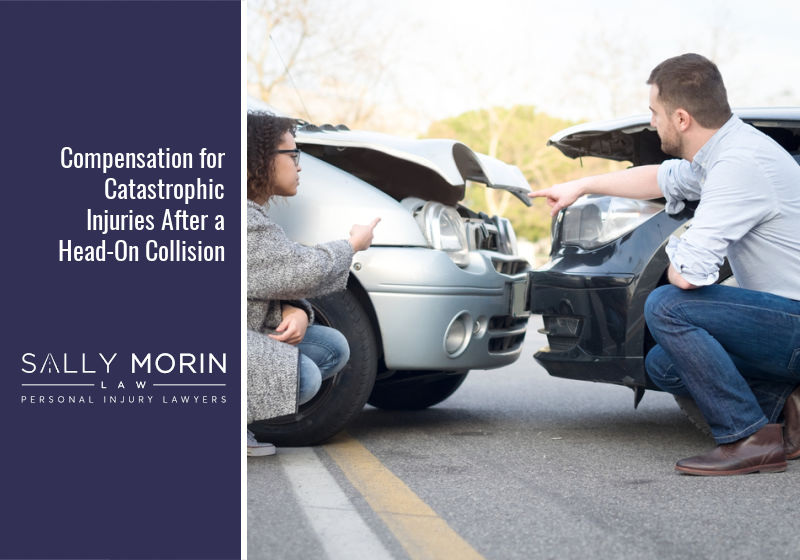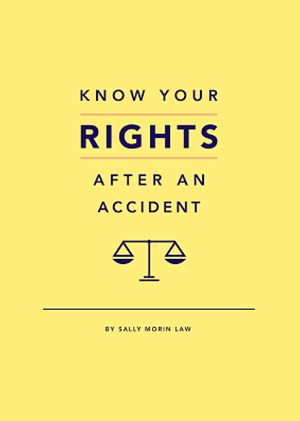Compensation for Catastrophic Injuries After a Head-On Collision
On May 16, 2023, a tragic head-on collision occurred in Riverside that claimed the life of an 8-year-old boy. Four others involved in the accident were hospitalized, including two minors.
A home security camera captured the fatal accident, revealing that a driver operating a Honda lost control of their vehicle and drifted into the opposite lane. As a result, the car collided with an oncoming Nissan, causing the young passenger to suffer fatal injuries.
This tragedy highlights the severity of head-on collisions and how they can cause catastrophic or even fatal injuries to undeserving victims. Head-on collisions are so serious that although they only account for 2% of all crashes, they cause over 10% of driving fatalities. On top of this shocking statistic, these deadly accidents cause numerous serious and catastrophic injuries every year, and these injuries can permanently alter a victim’s life.
If you or a loved one have experienced a head-on car crash, you should seek compensation for your damages, especially if you suffered from catastrophic injuries. The best thing you can do today to recover the full compensation you deserve for your financial losses and suffering is to contact an experienced head-on collision accident attorney, as they can help you build your case and maximize your damages. Here’s what you need to know about recovering compensation after a head-to-head collision.
Should I Accept an Insurance Company’s Settlement Offer After a Head-On Collision?
After suffering from a serious head-on accident caused by another driver, you may be contacted by their insurance company in the following days, and they may even offer you compensation for your injuries. Unfortunately, insurance companies are often quick to offer victims settlements that may sound reasonable, but in reality, these are lowball offers intended to dissuade you from seeking additional compensation.
Additionally, these companies are quick to offer settlements because you may not even know the full extent of your injuries and damages. Your injuries may eventually require surgery and ongoing treatment, and if you accept the insurance company’s first offer, you likely won’t be able to recover further compensation later.
Rather than speaking to the at-fault driver’s insurance company directly, it’s best to have a personal injury attorney handle all communication on your behalf. Also, it’s crucial that you never give an insurance company a recorded statement, as anything you say can be used against you and may hurt your catastrophic injury claim.
When an insurance company contacts you, it’s best to tell them to speak with your lawyer. Give them your attorney’s name and number, and then hang up.
Proving That a Driver Was at Fault for a Head-On Collision
To recover compensation after a head-on collision, you’ll need to supply as much evidence as possible proving that the other driver was at fault. The negligent driver’s insurance company is far more likely to pay out your claim if you can build an airtight case proving their client is liable and that you suffered damages as a direct result of the collision.
Some forms of evidence you can use to prove liability include:
- Police Accident Report: The police’s accident report will likely include details about the incident, statements from involved parties and witnesses, and the officer’s assessment of the scene. Accident reports aren’t always accurate, but they can be used as crucial evidence if the responding officer believes the other driver was at fault.
- Charges Against the Negligent Driver: Criminal charges against a driver may indicate fault after a head-on collision. Depending on the circumstances surrounding the crash, the police may charge the negligent driver with reckless driving, driving under the influence (DUI), or another traffic violation.
- Photographic Evidence: Photographs taken at the accident scene can provide visual documentation of the vehicles’ positions, property damage, road conditions, and any other relevant factors. Clear and accurate photographs can support your case and help establish fault.
- Video Evidence: If available, video footage from traffic cameras, surveillance cameras, or dash cams can be invaluable in proving liability if it captures the accident itself.
- Eyewitness Statements: Statements from individuals who witnessed the accident or its aftermath can corroborate that the other driver was at fault.
- Accident Reconstruction Expert: An accident reconstruction expert can analyze the accident scene, examine the vehicles, and reconstruct the events leading up to the collision.
- Cell Phone Records: You can use cell phone records to prove that a driver was operating their vehicle while distracted, but you’ll need a personal injury attorney to subpoena the records.
How Do I Prove That I Suffered Damages?
In addition to supplying ample evidence that the other driver was at fault, you’ll need to prove that you suffered damages as a direct result of the accident in question.
Forms of evidence you can use include:
- Medical Records: Medical records play a crucial role in documenting the extent of your injuries. They include information such as diagnoses, treatment received, medications prescribed, and any ongoing medical care.
- Medical Bills and Other Expenses: Preserving medical bills and receipts is essential. These documents demonstrate the costs you incurred for medical treatments, hospital stays, surgeries, medications, physical therapy, rehabilitation, and any other out-of-pocket expenses.
- Medical Expert Witness Testimony: In some cases, medical expert witnesses can provide professional opinions to support your claim for damages. This is especially important if you seek loss of future earnings damages, as a medical professional can supply their expert opinion about how your injuries will impact your ability to work going forward.
- Evidence of Lost Wages: Pay stubs, employment records, or a letter from your employer can demonstrate that the accident forced you to miss work.
- Mental Health Records: If the accident caused emotional or psychological distress, you can use mental health records as evidence, including evaluations, diagnoses, and treatment received from mental health professionals.
- Testimony from Loved Ones: If your injuries cause pain and suffering or keep you from enjoying life, testimony from friends and family can help corroborate your physical and emotional discomfort.
Depending on your unique case, you may be able to recover compensation for property damage, past and future medical bills, lost wages, loss of future earnings, and pain and suffering.
Contact a California Head-On Collision Attorney

If you’ve suffered from a collision caused by another driver, you need to contact a car accident attorney as soon as possible so that you can start building your case.
For head-on collision attorneys in California, contact Sally Morin Personal Injury Lawyers. We’ll negotiate a higher settlement on your behalf, and we can represent you in court if necessary to maximize your compensation.
Call us today at 877-380-8852, or you schedule a free case evaluation online here.











